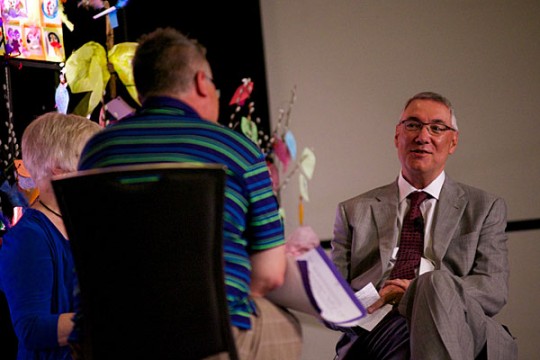Lutheran, Anglican development and relief agencies front and centre at Friday morning’s joint session
Categories: Anglican Church of Canada, Evangelical Lutheran Church in Canada

In Friday morning’s joint session, executive directors of Canadian Lutheran World Relief (CLWR) and the Primate’s World Relief and Development Fund (PWRDF) were interviewed together by segment host Bishop Michael Pryse of the Eastern Synod of the ELCIC.
Adele Finney, executive director of PWRDF, is also an artist, a published playwright, a spiritual director, and board member both of ecumenical justice organization KAIROS and the Anglican umbrella development agency Anglican Alliance.
Bob Granke—the executive director of CLWR—started with the organisation in the 1970s, but moved on to the Canadian Hunger Foundation in 1992. Bob returned to work for Lutherans in 1997 when he was elected secretary of ELCIC in 1997. He then served the Lutheran World Federation as their World Service Director before finally returning to CLWR in 2005 to serve as executive director.
Bishop Pryse began the interview by asking Ms. Finney and Mr. Granke about perceptions of their organizations and what they do—both from the public and from their own perspectives. “People wonder ‘why are you funding apes, and is a primate really president of your organization?’” said Finney, to laughter from the joint session. “Most people don’t know what a Primate is, so that’s a problem right off the top.”
As for their own perceptions, both Finney and Granke emphasized the centrality and importance of communication to the functioning of their organizations and their own roles as executive directors. Granke spoke about the paramount importance of relationships—with partners, church members, and beyond—and the sheer amount of time spent travelling and nurturing those relationships. “A lot of [what I do] is managing communications with colleagues and partners.”
Finney echoed that sentiment, adding “It constantly amazes me how things change very quickly… navigating change are words I use to describe what I do.”
Finney went on to explain the process PWRDF follows in its relief and development work—coming alongside partners to support them in achieving their goals for their own development—and followed up with an example.
Sri Lankan refugees in India had a problem. Young children and nursing mothers weren’t getting the nutrition they needed from their diets. The refugee agency in place, started by a Sri Lankan who had come to India 30 years previously, hit on the idea of spirulina, an algae that can be cultivated in tanks, dried, and used in many different food products, such as in drinks, or as a supplement in solid food. The agency came to PWRDF with this idea, and PWRDF provided the support the refugee agency needed to put the plan into action. They have become experts in cultivation of spirulina. People travel to learn about spirulina cultivation from the agency, and they now have 50 tanks in refugee camps around India. Refugees in each camp run the tanks and sell the spirulina back to refugee agency.
On the subject of disaster relief, one of the great strengths of church-based organizations is that very often church people are already there on the ground, said Finney, either working with the organizations’ ongoing development efforts or in churches native to the area.
When asked by Bishop Pryse about their vision of their organizations’ futures, Granke responded first, outlining the funding challenges for CLWR. Federal funding through CIDA will be ending for CLWR this year, and will likely not be renewed, forcing the organization to be creative in looking for new sources of funding. Granke also noted that CLWR was looking at expansion in advocacy work, specifically “challenging the causes of poverty.”
PWRDF continues to focus on food security, preventative health, and micro-finance, with special attention to what Finney called “edge habitats.” Those PWRDF wishes to serve live on the edges/margins of their societies, but there is great vibrancy there and lots of potential for the people who live there to build lives for themselves.
The interview ended with a cut to a short video, done in hand drawn white board animation, illustrating interviews with one CLWR volunteer and one PWRDF volunteer. The volunteers reflected on their experiences, their joys and challenges. They also spoke on where they would like the future to take their organizations and their churches.
At lunch time down the hall in the Joint Assembly dining room four tables were reserved in a corner of the room—each with representatives from CLWR or PWRDF—set up to allow people to continue the conversation started in this morning’s interview, and ask their own questions about the organizations and their work. Conversation at the table of PWRDF Executive Director Adele Finney ranged from discussion of navigating CIDA and government relations, to PWRDF’s involvement in micro-finance via Oikocredit, to the Anglican Alliance—an umbrella organization started at the last Lambeth conference with a view to coordinating efforts among Anglican relief and development agencies worldwide. Speaking on competition between agencies, Finney said “There’s enough work for all of us to do and more.”

No comments yet.